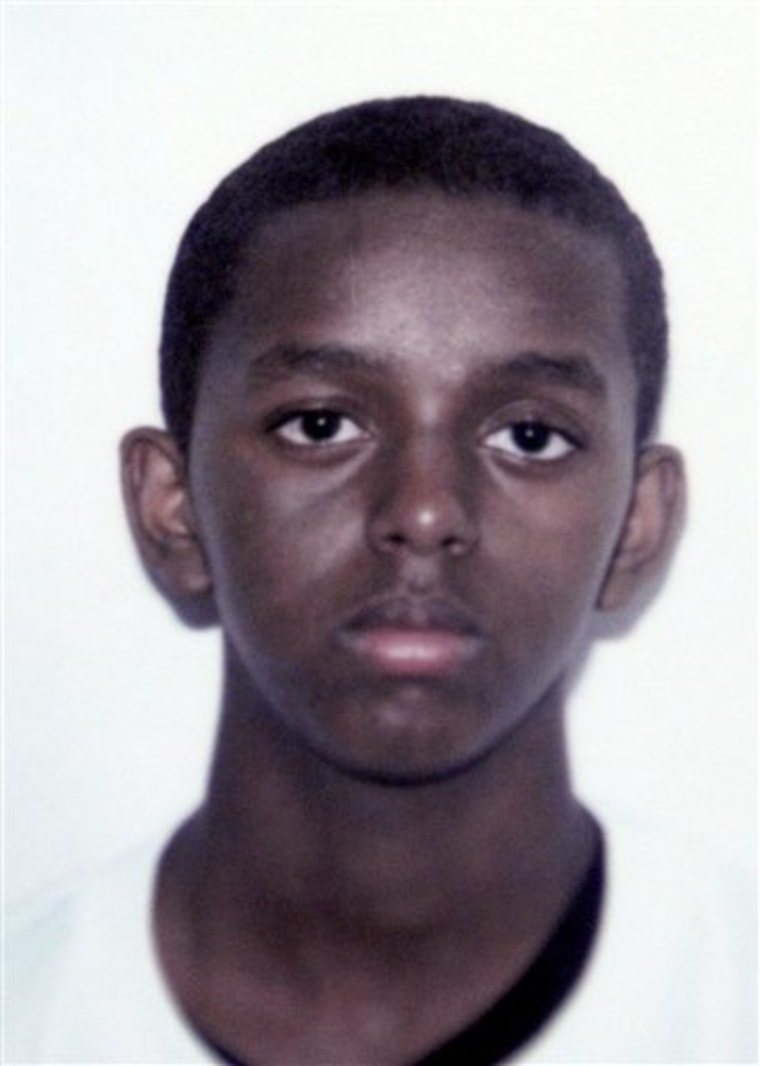Burhan Hassan was an infant when he left his homeland of Somalia. He grew up American, a bright student with dreams of becoming a doctor or lawyer.
But now his family is trying to find out why the 18-year-old was killed under mysterious circumstances in Somalia.
Hassan was one of about a dozen young Somali men who have gone missing from the Minneapolis area over the last couple years — recruited, their families say, by radical elements in Somalia. Relatives said they learned Friday that he had been killed and buried in Mogadishu, the Somali capital, but they had few details.
His death follows a suicide bombing carried out in that warring Horn of Africa country last October by another young Somali man from Minneapolis.
"We believe he was killed because he would have been a key person in the investigation into the recruitment (of young Somali men) here in Minneapolis," said Hassan's uncle, Abdirizak Bihi. Bihi said his nephew was found shot in the head in an open area of the city.
FBI, and victim's mother, withold details
Hassan's mother declined to comment Monday. But Bihi, her brother, said she's "devastated, the whole family's devastated."
"We had a young kid, we put all the efforts in our life to bring him here," Bihi told The Associated Press.
FBI Special Agent E.K. Wilson said he could not confirm whether Hassan had been killed. A State Department spokeswoman, Joanne Moore, had no firm information either.
The FBI has acknowledged an ongoing investigation into the disappearances, but won't elaborate. Several local Somalis say they've been questioned by the FBI, Customs officials, or subpoenaed to appear before a federal grand jury over the last several months.
"Everything is top secret. It's very hard to find out what's going on," said Omar Jamal, executive director of the Somali Justice Advocacy Center.
Hassan — who was raised by a single mother after his father died in an accident — was 8 months old when his family arrived at a refugee camp in Kenya. With two older brothers and a sister, he was not yet 4 when they came to the United States in 1996.
A bright student disappears
Hassan was a student at Roosevelt High School and was taking college courses such as calculus and advanced chemistry through the University of Minnesota, with dreams of attending Harvard University to study medicine or law.
"He never knew anything about Somalia. He grew up here. He was an American kid," Bihi said. He said his nephew did not even speak the Somali language.
But last November, Hassan disappeared at the age of 17. His mother reported him missing to police. Relatives said they feared he was recruited by al-Shabab, an extremist Islamist group considered by the U.S. State Department to be a terrorist organization with links to al-Qaida. Al-Shabab denies the links.
Last October, a Minneapolis man, Shirwa Ahmed, carried out a suicide bombing as part of a series of coordinated attacks that targeted a U.N. compound, the Ethiopian consulate and the presidential palace in Hargeisa, capital of the Somaliland region. FBI Director Robert Mueller said in February that the bomber had probably been "radicalized" in Minneapolis-St. Paul.
Bihi, Hassan's uncle, has said that Hassan called home from time to time but the calls were short and cryptic. When family members asked Hassan what he was doing, the teen quickly ended the phone conversation.
Minnesota mosque denies involvment
Bihi said the teenager, who was in poor physical shape, had been sick — possibly with malaria — and that his family had been working to try to bring Hassan to the U.S. Embassy in Kenya. Bihi said the family suspected that Hassan was killed by members of al-Shabab.
"The community really wants answers, and it seems it's taking longer and longer," said Taneeza Islam, civil rights director for the Council on American-Islamic Relations of Minnesota.
Jamal said there is a concern Hassan was killed because of plans to return to the U.S., and he noted others are still unaccounted for. "Someone ought to be held accountable for this," he said.
Like some of the other missing young people, Hassan had also attended the Abubakar As-Saddique Islamic Center in Minneapolis. Hassan had gone to the mosque for more than 10 years and was involved in a youth group there, another uncle told a U.S. Senate committee in March.
Officials of the mosque — the largest in Minnesota — have repeatedly denied accusations by families of some of the missing men that the mosque played a role in their decision to leave. The center's director, Omar Hurre, repeated on Monday that such allegations are "baseless."
Young men ‘embodied hopes’ of community
Hassan's relatives have said his disappearance came as a shock when the family discovered him missing Nov. 4, 2008.
In testimony to the U.S. Senate Committee on Homeland Security and Governmental Affairs, another uncle, Osman Ahmed, said they first became suspicious when they got a message from Roosevelt High School saying Hassan had missed all his classes that day. He said the youth's mother checked his room and found that his luggage, clothes and passport were missing.
Ahmed testified that all of the missing Somali-American youths he knew of who disappeared were not troubled kids or involved with gangs. On the contrary, he said, they embodied the hopes of their community.
"They were the doctors, lawyers, engineers, scientists and leaders of the future of our strong and prosperous nation," he said.
